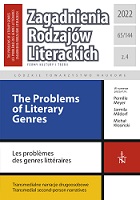Your Choice and Negative Affect in Alejandro Zambra’s Multiple Choice (2014) and Carmen Maria Machado’s In the Dream House (2019)
Your Choice and Negative Affect in Alejandro Zambra’s Multiple Choice (2014) and Carmen Maria Machado’s In the Dream House (2019)
Author(s): Denise WongSubject(s): Studies of Literature, Theory of Literature, American Literature, Sociology of Literature
Published by: Łódzkie Towarzystwo Naukowe
Keywords: second-person narration; hypertext fiction; shame; choice; Alejandro Zambra; Carmen Maria Machado;
Summary/Abstract: This essay builds upon David Herman’s idea of double deixis to explore the ‘choose-yourown-adventure’ (CYOA) form as a popular subtype of you-narration that foregrounds reader involvement, co-creation, and agency. The central conceit from such instances of hypertext fiction to self-help writing seems to be that you — the reader/consumer — have a choice. However, in my reading of Alejandro Zambra’s Multiple Choice (2014) and Carmen Maria Machado’s In the Dream House (2019), the false equivalence between choice and non-choice becomes particularly palpable when considering the affect of the second-person mode. While the former exemplifies what Irene Kacandes has called ‘proto-’ or ‘paper hypertext’ (2001: 200), the latter is also a memoir. I look at the underexamined intersection of hypertext fiction and autobiographical writing in the history of second-person narratives to restore the significance of negative affect to critical discussion. The agency to choose in you-narratives not only involves the anticipation of guilt, fault and/or shame, but autodiegetic instances of you-narration like Machado’s memoir formalise Jean-Paul Sartre’s phenomenological description of shame and Denise Riley’s concept of malignant inner speech, or malediction.
Journal: Zagadnienia Rodzajów Literackich
- Issue Year: 65/2022
- Issue No: 4
- Page Range: 35-50
- Page Count: 16
- Language: English

